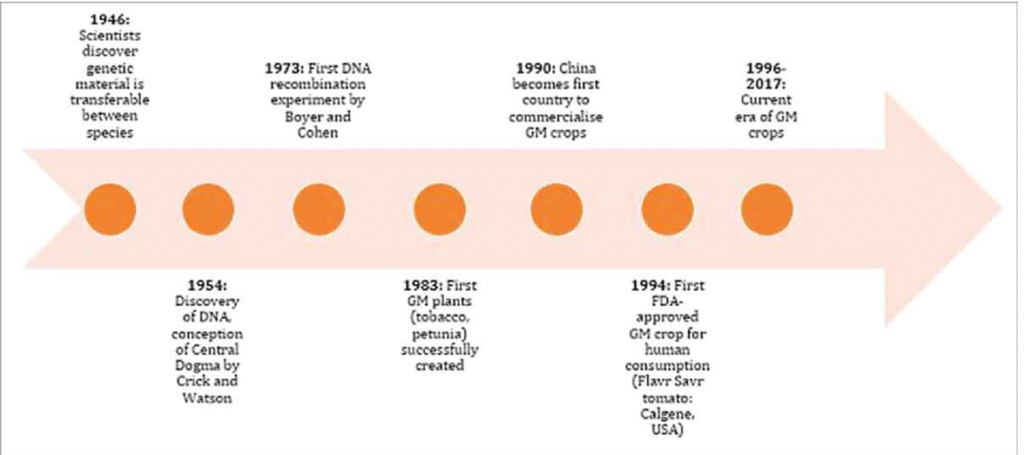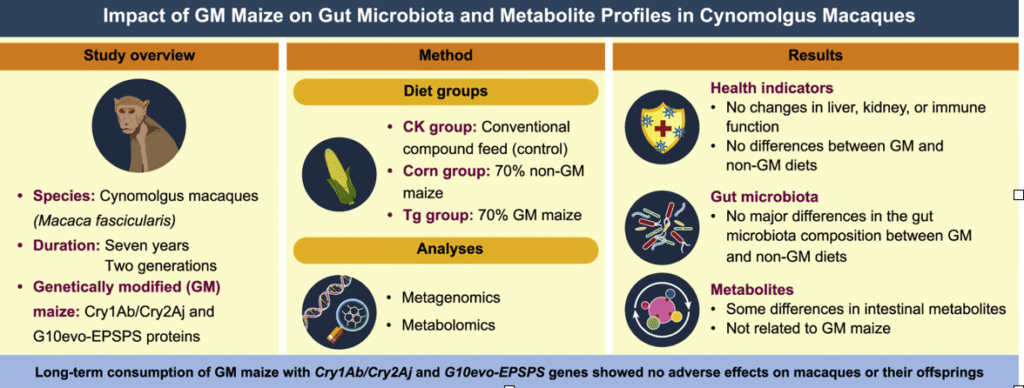
In deafening silence, a study by Wang et al. was published, revealing the long-term effects of GMO diets on a macaque population. Dr. Guy-André Pelouze revisits this research.
GMOs are the enfants terribles of genomics, whose fear was real in the nineties.
Experimental studies, especially human clinical trials, belong to the domain of slow thinking (Daniel Kahneman), contrary to emotional slogans filled with poor evidence or manipulated data, which trigger fast emotional thinking. One remembers in this topic the false evidence published, then retracted, then republished (1) on GMO. It appears that evidence shows that all we are seeing in this recycled paper is more due to random variation in a poorly controlled experiment than any carcinogenicity, even in rodents. It does not show that GMO corn, or Roundup, even at concentrations that no human would ever be exposed to through diet, has any effect on cancer or mortality. In this battle, one must keep one’s own strength to analyze and criticize scientific experiments instead of wasting time tilting at windmills.

GMO was a trendy example of this opposition, and it is always considered in organic or fancy traditional agriculture as a danger, an evil, and the stuff of Frankenstein. Recently researchers added a piece of the puzzle, which is brilliant and should shift the debate on GMOs. Let us analyze this paper (2)
Methodological Strengths
The study was designed with three important characteristics. Macaca fascicularis (cynomolgus macaques) is a non-human primate species. It is a well-established non-human primate model with high translational relevance to humans. That differentiates this study from several other studies based on rodents. The study followed two generations, both F0 and F1, over 7 years, a fact that is rare for GM food studies. Three groups were fed differently: CK (standard feed), Corn (70% non-GM maize), and Tg (70% GM maize). The GM maize in the diet was pondered to detect a proportional effect. Several controlled variables allow the same cultivation conditions for GM and non-GM maize (no glyphosate use), and a high-quality nutritional matching.
Data are recorded in depth about multi-omics: metagenomics (gut microbiota), metabolomics (fecal metabolites), and full hematology, hormones, and urine parameters. The technology used in this experiment is up-to-date.
The health effects of genetically modified (GM) crops compared to their non-GM counterparts remain controversial, particularly with regard to long-term dietary exposure.
This is partly because short-term effects are rare. That’s why opponents of GMOs turn their attention to long-term transgenerational effects, even though they don’t have strong preliminary evidence. One of the less controversial data about diet modifications is that they influence the quantity and the diversity of gut flora. The gastrointestinal microbiome is highly sensitive to dietary components and plays a critical role in host metabolism, immune function, and neurological health through the link with the brain. In addition, the diversity of the gut microbiota is increasingly considered an important marker for assessing the safety of genetically modified crops. Disruption of gut microbial populations can lead to serious health problems, including obesity, malnutrition, and diabetes. This is the reason why concerns remain about the effects of Bacillus thuringiensis (Bt) on the gut microbiota. Studies have detected cryotoxin fragments in the feces of cows consuming diets containing MON810 and investigated the composition and relative abundance of fecal microbiota in Sprague-Dawley rats following a 10-week diet consisting of two GM maize strains, a homozygous maize variety, and a standard AIN93G diet. Their results indicate that non-GM and GM corn varieties resulted in an increase in the number of bacterial groups associated with carbohydrate metabolism, which could be interpreted as an adaptation to corn nutrients. However, research has also shown that broiler chickens consuming glyphosate-tolerant GM soybeans show no changes in their gut microbial populations. Similarly, pigs fed GM corn containing Bt showed no significant effect on microbial populations in their feces, ileum, or cecum. Furthermore, no discernible differences in fecal microbiota composition were observed between the control group fed non-transgenic maize and the group fed transgenic maize. This conclusion was based on an analysis of fecal microbiota composition in Wistar rats fed glyphosate-tolerant NK603 and Bt toxin MON810 transgenic maize during 6 months.
The gut microbiome is a key indicator of health; however, studies investigating the impact of GM crop consumption on the gut microbiome remain limited.
This study presents a comprehensive 7-year evaluation of GM maize expressing cry1Ab/cry2Aj and G10evo-EPSPS proteins through metagenomic and metabolomic analyses.

We assessed the effects of GM maize consumption on gut microbiota diversity and metabolite profiles in cynomolgus macaques (Macaca fascicularis) compared with non-GM maize. Three diet regimens were implemented: a conventional compound feed (CK group), diet formulation containing 70 % non-GM maize (Corn group), and diet formulation containing 70 % GM maize (Tg group). The results demonstrated that feeding GM maize to the first (F0) and second (F1) generations of monkeys did not substantially affect the composition, community structure, or function of the intestinal microbiome, as indicated by species composition and diversity analyses. Minor differences in intestinal metabolites were observed but were not directly linked to transgenic maize consumption. Collectively, long-term intake of maize with cry1Ab/cry2Aj and g10evo-epsps genes had no adverse effects on macaques or their offspring.
This experimental longitudinal Study Finds No Adverse Health Effects of GM Maize in Primate Model
Genetically modified foods have become increasingly prevalent in daily life, raising concerns about their safety and public acceptance, which in turn may influence their adoption in agricultural production.
Key findings
About gut microbiota, there are no major differences in microbiota diversity, composition, or structure between groups. Dominant taxa remained stable across F0 and F1 (e.g., Prevotella, Bacteroidetes, and Bacillota). Minimal changes in the network structure of microbial co-occurrence.
Fecal metabolites showed significant differences in several metabolites between Tg and corn groups (e.g., mannitol, glucitol, pyridoxine, and phthalic acid). Pathway differences were observed: GM maize enriched vitamin/amino acid metabolism; non-GM maize enriched carbohydrate metabolism.
Clinical indicators are important. Blood sampling showed small decreases in mean corpuscular hemoglobin concentration (MCHC) and platelet count (PLT) in the Tg group (F1 only). Some urine markers (e.g., protein, bilirubin) were more positive in the Tg group but not statistically significant. No significant changes in major hormone levels, liver/kidney markers, or thyroid function.
Significance
The results of this study provide substantial evidence to support the global body of research on the safety of GM crops. While the study did not assess cellular and mucosal immunity, it establishes a methodological framework for longitudinal safety assessments of GM crops. The researchers conclude that there are no significant health risks associated with long-term consumption of GM maize.
GM maize had no significant effect on the gut microbiota of macaques. Long-term GM maize intake did not harm macaques or their offspring. This study supports the safety of GM maize feeding during 7 years in nonhuman primates.
Suggested follow-up Studies
- Include glyphosate-treated GM maize to reflect real agricultural use.
- Correlate metabolic changes to clinical outcomes (behavior, immunity, reproductive fitness).
- Conduct independent replications in different GM maize cultivars.
- Evaluate offspring fertility, cognition, and aging markers across generations.
These studies are pricey. It is possible that artificial intelligence will improve the goals of follow-up studies of GMOs.
Overall Conclusion
This study is a landmark in GM crop safety research because it uses non-human primates, it is longitudinal (7 years) and multigenerational, and it applies state-of-the-art multi-omics tools.
It provides no compelling evidence of harm from GM maize consumption in primates, but it also does not rule out subtle metabolic alterations whose clinical significance remains uncertain.
(1) https://enveurope.springeropen.com/articles/10.1186/s12302-014-0014-5/comments
(2) https://www.tandfonline.com/doi/full/10.1080/21645698.2017.1413522#d1e127
(3) https://www.sciencedirect.com/science/article/pii/S0278691525001875?via%3Dihub
(4) https://www.sciencedirect.com/science/article/pii/S0278691525001875?via%3Dihub
This post is also available in: FR
“It provides no compelling evidence of harm from GM maize consumption in primates, but it also does not rule out subtle metabolic alterations whose clinical significance remains uncertain.”
Subtle metabolic alterations occur all the time. That’s what homeostasis is about. But I’m sure you realize this point, so it’s not an omission of certainty as much as a realization that you cannot conclude a hazard exists if minor changes are occurring in a highly dynamic phenomenon influenced by just about everything we humans experience.